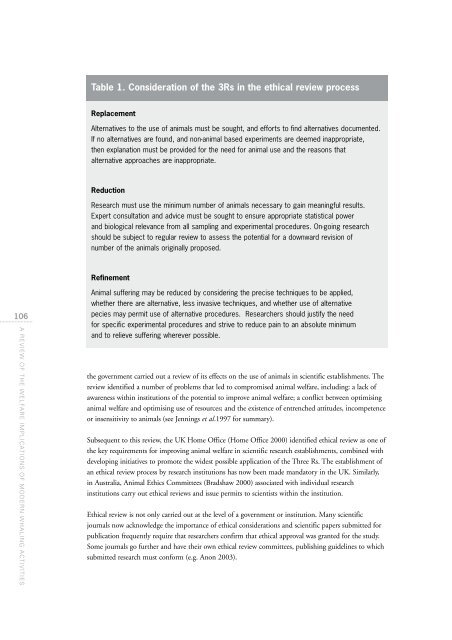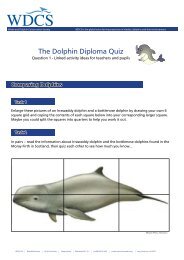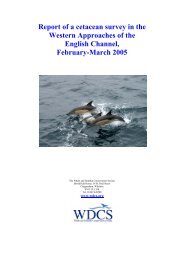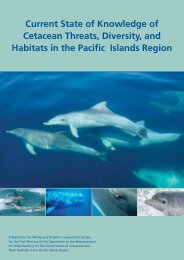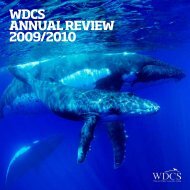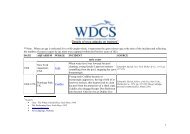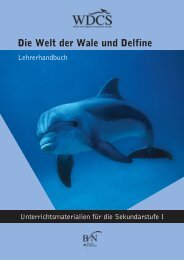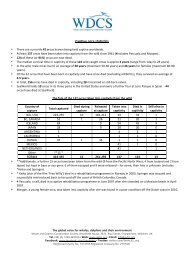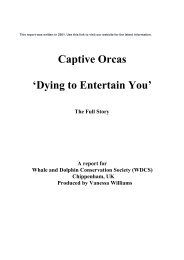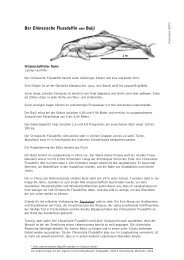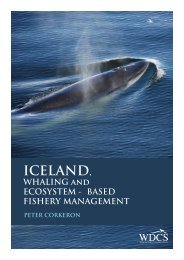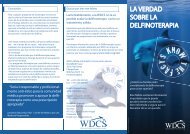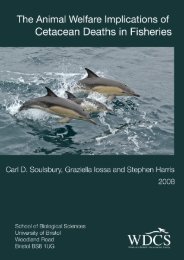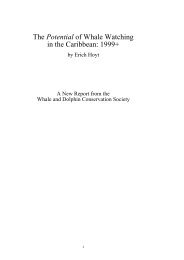TROUBLED WATERS - Whale and Dolphin Conservation Society
TROUBLED WATERS - Whale and Dolphin Conservation Society
TROUBLED WATERS - Whale and Dolphin Conservation Society
You also want an ePaper? Increase the reach of your titles
YUMPU automatically turns print PDFs into web optimized ePapers that Google loves.
106<br />
A REVIEW OF THE WELFARE IMPLICATIONS OF MODERN WHALING ACTIVITIES<br />
Table 1. Consideration of the 3Rs in the ethical review process<br />
Replacement<br />
Alternatives to the use of animals must be sought, <strong>and</strong> efforts to find alternatives documented.<br />
If no alternatives are found, <strong>and</strong> non-animal based experiments are deemed inappropriate,<br />
then explanation must be provided for the need for animal use <strong>and</strong> the reasons that<br />
alternative approaches are inappropriate.<br />
Reduction<br />
Research must use the minimum number of animals necessary to gain meaningful results.<br />
Expert consultation <strong>and</strong> advice must be sought to ensure appropriate statistical power<br />
<strong>and</strong> biological relevance from all sampling <strong>and</strong> experimental procedures. On-going research<br />
should be subject to regular review to assess the potential for a downward revision of<br />
number of the animals originally proposed.<br />
Refinement<br />
Animal suffering may be reduced by considering the precise techniques to be applied,<br />
whether there are alternative, less invasive techniques, <strong>and</strong> whether use of alternative<br />
pecies may permit use of alternative procedures. Researchers should justify the need<br />
for specific experimental procedures <strong>and</strong> strive to reduce pain to an absolute minimum<br />
<strong>and</strong> to relieve suffering wherever possible.<br />
the government carried out a review of its effects on the use of animals in scientific establishments. The<br />
review identified a number of problems that led to compromised animal welfare, including: a lack of<br />
awareness within institutions of the potential to improve animal welfare; a conflict between optimising<br />
animal welfare <strong>and</strong> optimising use of resources; <strong>and</strong> the existence of entrenched attitudes, incompetence<br />
or insensitivity to animals (see Jennings et al.1997 for summary).<br />
Subsequent to this review, the UK Home Office (Home Office 2000) identified ethical review as one of<br />
the key requirements for improving animal welfare in scientific research establishments, combined with<br />
developing initiatives to promote the widest possible application of the Three Rs. The establishment of<br />
an ethical review process by research institutions has now been made m<strong>and</strong>atory in the UK. Similarly,<br />
in Australia, Animal Ethics Committees (Bradshaw 2000) associated with individual research<br />
institutions carry out ethical reviews <strong>and</strong> issue permits to scientists within the institution.<br />
Ethical review is not only carried out at the level of a government or institution. Many scientific<br />
journals now acknowledge the importance of ethical considerations <strong>and</strong> scientific papers submitted for<br />
publication frequently require that researchers confirm that ethical approval was granted for the study.<br />
Some journals go further <strong>and</strong> have their own ethical review committees, publishing guidelines to which<br />
submitted research must conform (e.g. Anon 2003).


